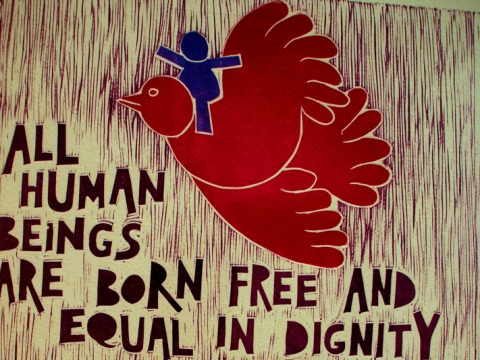
A couple of weeks ago the Russian Foreign Ministry released a report, criticizing human rights violations in the United States. By giving examples like the Guantánamo Bay prison, the ministry said that “the situation in the United States is a far cry from the ideals that Washington proclaims”. While the report wasn’t received too seriously by the international community, it nevertheless illustrates an interesting phenomenon in international relations: states using human rights rhetoric regardless of their own human rights record. Prior to Russia, China accused the US of undermining Internet freedom through its campaign against WikiLeaks. While Beijing may have a point, it is nevertheless provocative to hear such claims made by the likes of Russia and China. So are human rights nothing more than a rhetorical tool utilized by states?
Since the adoption of the Universal Declaration of Human Rights in the aftermath of World War II human rights have experienced an institutional expansion at the international level. This resulted in a worldwide system of treaties and other sources of law (including international customary law) that seek to safeguard human rights. Over the last few decades, many countries have become increasingly democratic and free. For scholars of international law, this worldwide relative improvement of human rights is a sign of the success of the international human rights regime. Paradoxically though, results from studies that examine the impact of human rights treaties on state behavior show almost no significant effect. On the contrary, treaties are sometimes even used as a shield to hide worsening state practices.
From a realist perspective, compliance with international human rights principles only happens when international law coincides with national interests. And since the international human rights regime lacks almost completely any enforcement mechanisms, the decision to meet human rights standards and comply with international treaties is left to sovereign nation-states. A state’s decision to ratify a human rights treaty often rests on the opportunity to gain legitimacy through a legal commitment to human rights, without being forced to comply with the treaty.
Realism can’t however explain why human rights have actually improved despite the inefficiency of the human rights treaties. Hafner-Burton and Tsutsui describe this paradox with the double-edged compliance dynamic of international human rights treaties. Their empirical analysis showed that although treaty ratification does not translate directly into government respect for human rights, the states’ commitment to human rights provides non-governmental actors with important tools to pressure governments towards protection of human rights. Accordingly the norms codified in the international legal system are successfully leveraged by international NGO’s.
This mechanism draws on sociological institutionalism (although the authors call it world society approach) that looks at how states are driven by global cultural factors. The approach argues that governments can be socialized and influenced by institutionalized international norms and values.
Through the lens of sociological institutionalism Russia’s and China’s criticisms of the United States’ record on human rights is a positive sign, because it implies that Beijing and Moscow accept the legitimacy of human rights. By signing treaties, or using human rights rhetoric to enhance its own legitimacy, Russia and China on their part strengthen the international legitimacy of human rights and allow NGO’s to leverage those global norms as a tool to pressure their national governments. However, this logic works on the assumption that NGO’s have a certain power. Their influence within democracies is out of the question, but unfortunately repressive states are the ones most in need of human rights improvements.


One reply on “International Human Rights Treaties- Curse or Blessing?”
Our partner openDemocracy have an interesting article on the Russian report – http://www.opendemocracy.net/od-russia/oliver-bullough/poking-with-human-rights-stick